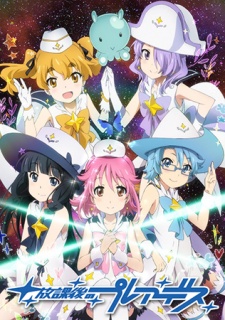
The mechanic of magic in Wish Upon the Pleiades—and indeed precedent tells us that there must be a mechanic—is potential: the potential to be different, to be relevant, to be a better person than the frustrating wreck you turned out to be. Anyone who doesn’t believe that to be a worthwhile cause for seeking out magical forces that bend the laws of the universe probably never went through middle school, where the angst is thick enough to cut with a knife. Paralleling the personal search for potential in the seemingly infinite series of choices that could have been made and lives that could have been led, we see the physical search for magic in the seemingly infinite vastness of space itself. This is actually a clever way to set the form and content side by side, and challenge the complexity of one’s personal journey with the tangible essence of reaching farther and farther into the abyss only to have less and less of a way to figure out if they picked the right direction. So that’s all well and good; the next step is to work that ideal into something convincing, into a story that has any sort of entertainment value beyond a light show with tears and the power of friendship. Precedent tells up this will fail, and once again precedent is spot-on.
Where there's space there's a spaceship, and where there is potential there are parallel worlds. And indeed a dimension-travelling alien spaceship crashes on earth amidst a journey to find a universe that will support the alien race’s survival. Five young girls see the spaceship crash as a meteor shower, and begin to wonder about space and their lives. Huh. One girl named Subaru takes this to the extreme as she becomes a space nerd, and by the time middle school rolls around she is the president and sole member of the astronomy club. Entering into the observatory one day causes a dimensional mishap that sends her to a garden in a glass dome, where she meets a secluded boy named Minato. Soon afterwards another error occurs, and she sees the alien from the spaceship and four girls all dressed as witches with broomsticks, who are planning to set off into the sky to capture a spiky crystal ball. One of the girls is Subaru’s friend Aoi, who Subaru remembers going to a different middle school, leaving her behind. Interestingly enough Aoi has the exact same memory in reverse; Subaru is the one out of place at the school. From there begins the search for spaceship pieces, musings about probability and potential, and a struggle against a mysterious boy that looks like Minato but totally couldn’t be him, because otherwise Subaru would have figured it out, right?
Like the antagonist mysteriously veiled behind all the secrecy of a glass door, there are too many mechanics of Wish Upon the Pleiades that are just plain irritating. There is no place for science in a magical girl show, and especially not for absurd pseudoscience. I am not talking about the aspects of using “potential”, because that works as a thematic element; no I am talking about singularities, Hawking radiation, and physics that makes less sense than the gels from Portal 2 . The more the characters talk about how their powers work, the less we are allowed just accept that they work because we are watching a magical girl show and they are using magic, let alone sit back and watch things happen. Ditto their emotions and deliberations. If we can’t infer the inner turmoil of a character as they are confronted with recurring family circumstances gone amuck, or the possibility of losing their precious friends as they move forward to grab the potential of a better life, then saying it outright in words is probably not the way to make it hit home. Maybe we just haven’t been given enough reason to care.
But at least the broomsticks rev like the engine of a car, which is downright absurd in all the right ways. Legend has it that when the first few episodes were streamed live online, all the viewers stopped paying attention to the plot and focused their efforts on figuring out which car each girl drives based only on the sound of the engines. What I like about that story is both how it illustrates the potential for people to find enjoyment in the most minor details in an otherwise vapid use of 20 minutes, and their willingness to ignore everything else. Unfortunately that may have been the only time where there was any potential for Wish Upon the Pleiades to be an enjoyable experience.